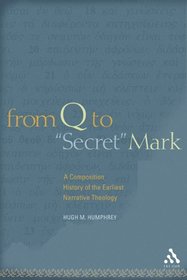Search -
From Q to "Secret" Mark: A Composition History of the Earliest Narrative Theology
From Q to Secret Mark A Composition History of the Earliest Narrative Theology
Author:
The literary complexity and the theological nuances of the Gospel of Mark did not spring from the evangelist's pen at a single sitting. The evangelist we call "Mark" composed segments of our present gospel for different situations, over an extended period of time, perhaps several decades, and that the present text reflects the mature, spiritual ... more »
Author:
The literary complexity and the theological nuances of the Gospel of Mark did not spring from the evangelist's pen at a single sitting. The evangelist we call "Mark" composed segments of our present gospel for different situations, over an extended period of time, perhaps several decades, and that the present text reflects the mature, spiritual ... more »
ISBN-13: 9780567025128
ISBN-10: 0567025128
Pages: 170
Rating: ?
ISBN-10: 0567025128
Pages: 170
Rating: ?
0 stars, based on 0 rating
Publisher: T. & T. Clark Publishers
Book Type: Paperback
Other Versions: Hardcover
Members Wishing: 2
Reviews: Amazon | Write a Review
Book Type: Paperback
Other Versions: Hardcover
Members Wishing: 2
Reviews: Amazon | Write a Review
Genres:
- Religion & Spirituality >> General
- Religion & Spirituality >> Bible & Other Sacred Texts >> Bible >> New Testament
- Christian Books & Bibles >> Bible Study & Reference >> Criticism & Interpretation >> New Testament
- Christian Books & Bibles >> Bible Study & Reference >> Criticism & Interpretation >> Exegesis & Hermeneutics




